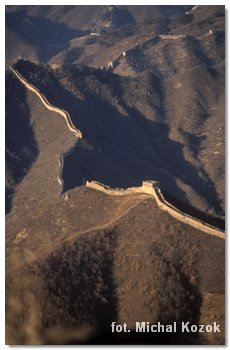
In 2001, during my first visit to China I visited Yungang Caves and the Hanging Monasteries near Datong, the city of Beijing, Terracotta Army near Xi'an and the Stone Forest near Kunming.
![]()
highlights - China is so big and diverse country that it's hard to get bored here. You can always find something for yourself. However, in recent years authorities have discovered that they can make good money on tourism. And unfortunately they do it in a very strange way - above all they try to make nature more beautiful than it is, making kitsch artificial waterfalls, restored temples, concrete lookouts, etc. Admission fees compare to Chinese reality are considerably high, particularly in relation to the accommodation and food (even after student 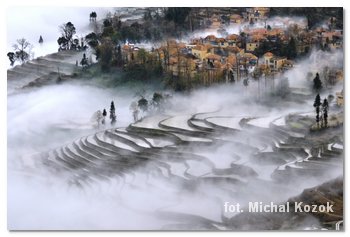
If you are using Lonely Planet 2005 edition, the southern provinces are badly written by reporter Katja Gaskell. She has mixed names, directions, etc. sometimes I was sure that she didn't visit the describing site.
![]()
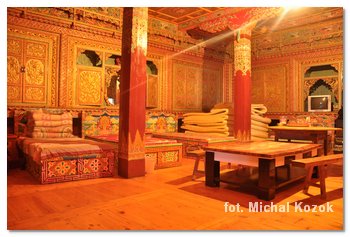
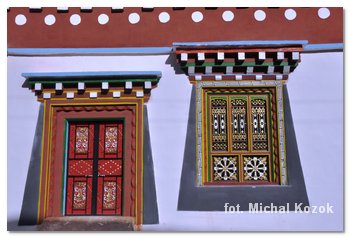
![]()
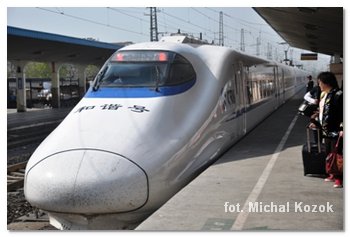 transport – an organization of Chinese railway is admirable. Everything is perfectly prepared. Actually looks like a check-in at the airport. You can buy a ticket only outside the station, and you can enter inside only with it. Then follows the luggage x-ray - which unfortunately, is pretty stupid in this case - often the guards go for a break, they do not even look at the monitor, it's simply just fill the job vacancies. Then you are going to proper designated waiting room for your train number. In the waiting room about 10-30 minutes before departure the passengers are allowed to go on the platform. You can plan your itinerary using Google maps . When you select two different cities in "get directions”, the program will show you trains schedule (trains numbers, departing and arriving times).
transport – an organization of Chinese railway is admirable. Everything is perfectly prepared. Actually looks like a check-in at the airport. You can buy a ticket only outside the station, and you can enter inside only with it. Then follows the luggage x-ray - which unfortunately, is pretty stupid in this case - often the guards go for a break, they do not even look at the monitor, it's simply just fill the job vacancies. Then you are going to proper designated waiting room for your train number. In the waiting room about 10-30 minutes before departure the passengers are allowed to go on the platform. You can plan your itinerary using Google maps . When you select two different cities in "get directions”, the program will show you trains schedule (trains numbers, departing and arriving times).
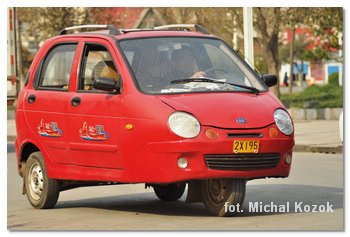
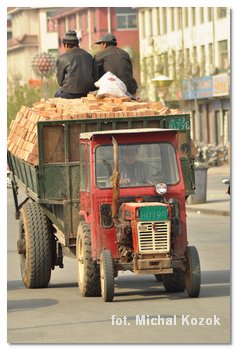
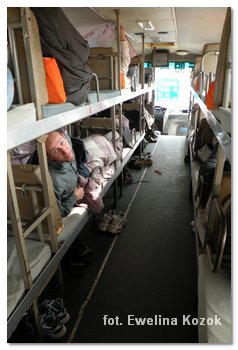
Urban buses cost usually between 1 and 2 Y (up to 0.2 €). I do not know whether this is the rule, but I noticed that in all visited cities a bus No. 1 was running to the long-distance bus station.
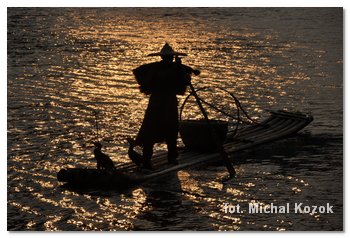
At first glance, the Chinese traffic looks dangerous. I think it is not as bad as it seems. First of all, speeding isn't the problem, but overtaking (on a turn, on a double line, etc). However, the difference in driving in Europe lies in the fact that no one expects someone on your lane moving towards you, and in China, yes. The driver knows that here are no rules and as soon as he sees someone riding towards a collision, slow down or make him a space, they all expecting abnormal driving and they are all careful at all times.
![]()
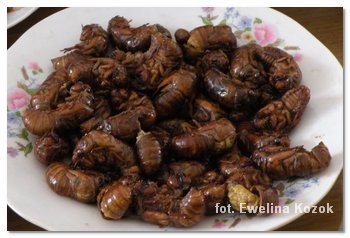 food – more than one book has already been written about Chinese food. So I won't write what you should eat, because anyway it is almost everything here. In the Guangdong Province is a saying "You can eat everything that has four legs except the table, and everything what flies except an airplane". Therefore, I only order the meat when I see it in raw form before preparing. The street shops present dead animals ready for consumption in various forms: in fur, with hooves, teeth, occasionally even half alive scorpions on the stick. But I didn't let myself to try eat dog, fried small bird, butterfly larvae, etc. Only once I was tempted to try cicada insect. That fried cicada with eyes and legs tasted like chips, just wings were hard to chew. In China food selection is huge, you will always find something to meet your taste. In addition, you should experiment, because theoretically ordered the same dish, even in a bar next door, can taste completely different.
food – more than one book has already been written about Chinese food. So I won't write what you should eat, because anyway it is almost everything here. In the Guangdong Province is a saying "You can eat everything that has four legs except the table, and everything what flies except an airplane". Therefore, I only order the meat when I see it in raw form before preparing. The street shops present dead animals ready for consumption in various forms: in fur, with hooves, teeth, occasionally even half alive scorpions on the stick. But I didn't let myself to try eat dog, fried small bird, butterfly larvae, etc. Only once I was tempted to try cicada insect. That fried cicada with eyes and legs tasted like chips, just wings were hard to chew. In China food selection is huge, you will always find something to meet your taste. In addition, you should experiment, because theoretically ordered the same dish, even in a bar next door, can taste completely different.
I also do not understand why turning table idea has not adopted anywhere else in the world. The idea is brilliant. We sit together with friends around the table, we have our plate in front of us, and the middle part is rotating. There are various dishes circulating among guests - if you wish to eat something, then stop the dish in front of your face, then load it on your plate and in a moment someone else will twist the table. 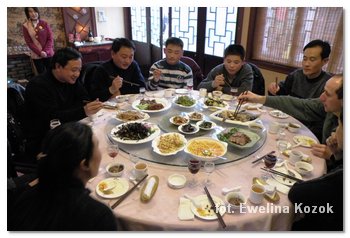
We were invited to school banquets. Overall, the party is for government money. It's surprised that there is too much food (just 50 years ago China was dying of starvation, and now throws tons of food to the rubbish). The event host all the time makes sure that your plate isn't empty. This is a good opportunity to try unknown meals. Unfortunately these banquets carry a certain risk – we were pushed to drink alcohol. Actually, sometimes I would be happy to drink, but not when I'm forced. 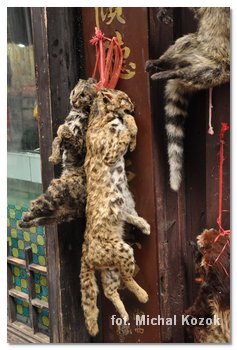
The good alternative to the restaurants is street food - cheap and delicious. But interesting thing we noticed that rice is seldom served. For example in our Shandong Province, in most restaurants there is no rice at all (in Southern China it was everywhere). Unfortunately in whole China (except a few big cities with western supermarkets with a 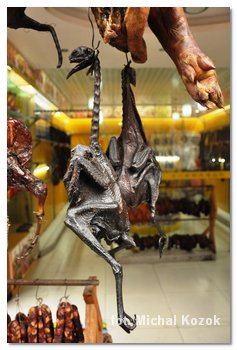
Wherever and whatever you eat in China, you must be able to handle chopsticks. No one uses fork and knife, but the spoon sometimes is used for soups consumption - from which the noodles are eaten with chopsticks and liquid soup with a spoon. But using two wooden chopsticks is not hard to learn.
![]()
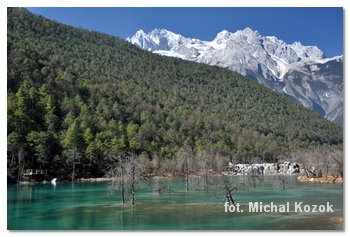
currency - ATMs are located in almost every village. Cash can be safely exchanged in Bank of China. It's hard to exchange yuans into dollars or euros.
internet - internet cafes are everywhere. They are cheap, usually 3 Y per hour. However, printing and scanning is not so popular in smaller towns. In regions such as Xinjiang the authorities suspended the internet and long distance calls for around half a year.
![]()
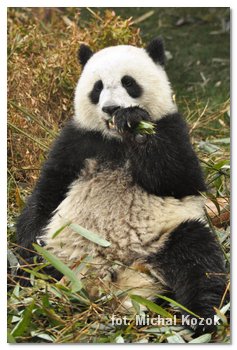
If you want to obtain a Chinese tourist visa in Almaty - I recommend Bridge Tour Agency (Tel: (727) 296 95 60, Zenkov St. 13). Very nice girl (embassy employee) will arrange a visa support for you (letter of invitation) and it is relatively cheap - the whole visa for 9000 Tenge (42 €), 5-7 days of waiting. You could also do a priority processing (3 days) for 16,500 Tenge (77 €).
In Ulaan Bataar the Chinese Embassy is open on the same days and similar hours as embassy in Almaty - Mon, Wed and Fri, from 9.30 to 12; receiving the documents between 4-5 pm. You need to have two photos, a passport photo copy, an entry ticket to China (first time I've seen such a nonsense, are they afraid to give you a visa to China, and you won't go there?), hotel booking (that one is not always required). Everything depends on the person in the window (exp. whether can be just a reservation or original ticket).